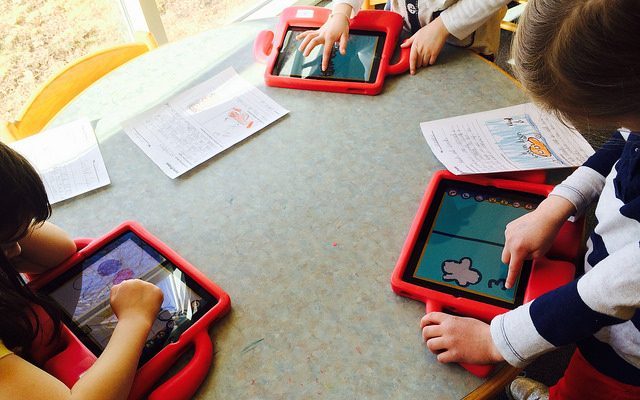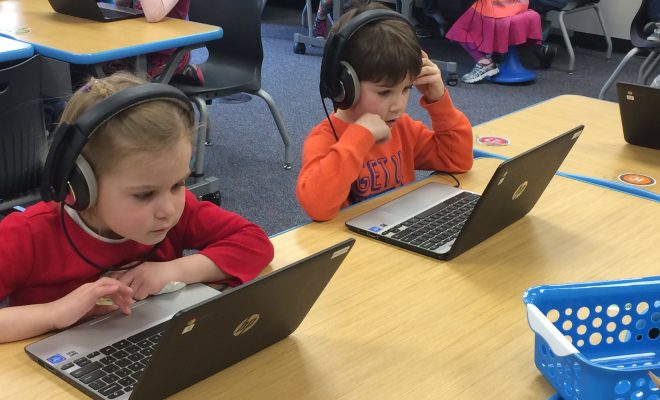All You Need to Know About Buying Virtual Reality Headsets, Goggles, and Glasses

With virtual reality being one of the biggest trends to hit edtech in years, educators need to know as much about this technology as possible. As a matter of fact, education futurists are predicting that this technology will be instrumental in the future of education, right up there with personalized learning. In a previous article, we provided our readers with a list of the best virtual reality games on the market. As a follow-up, this article will teach them all they need to know about virtual reality headsets, goggles, and glasses. The first thing that you need to know is that when people use the terms virtual reality headsets, goggles, and glasses, they are mainly talking about the same thing.
For the purpose of this article, we decided to use the term headset, because it is the most widely used term to refer to an apparatus used to power a virtual reality environment. Think of the games as the software, and headsets as the devices that run the software. These parts make virtual reality possible.
What is a Virtual Reality Headset?
Virtual reality headsets, just create a virtual reality environment for the user. The best virtual reality lets you explore a virtual space like you are actually there. They are widely used for gaming, but also have applications in other fields, including education. In education, they are highly coveted for their ability to simulate training environments. For example, medical students can use virtual reality headsets to practice medical procedures. Virtual reality headsets are made up of a stereoscopic head-mounted display (which provide individual images for each eye) stereo quality sound, and tracking sensors that monitor head motion.
Purchasing Virtual Reality Headsets
If you are in the market to buy a virtual reality headset, keep in mind that the virtual reality devices that are available today will be obsolete by the beginning of the next year. However, that does not mean that you should wait to make a purchase. Many of the virtual reality headset options that are available today are fun, inexpensive and can be powered by your phone.
Modern virtual reality headsets fit into one of two categories, mobile or tethered. Mobile headsets are essentially shells with lenses into which you place your cell phone. The lenses partition the screen into two distinct images, one for each eye, essentially turning your phone into a virtual reality device. Mobile headsets like the Samsung Gear VR and Google Cardboard are priced at under $100, which makes them more affordable for the average person. However, smartphones are not made distinctly for virtual reality and as a result, do not provide the best visual experience for the user.
Tethered headsets have to be physically connected to PCs for them to work. The physical connection can be a bit awkward, but allowing your computer to do the video processing makes your virtual reality experience more complex, which is a good thing. This also means that the display is built into the headset, instead of your smartphone. This drastically improves both the video image and head tracking.
However, there is a trade-off, as you probably have already guessed. The least expensive tethered virtual reality headset is $400, and it requires up to $160 in extra accessories to operate the device. The Oculus Rift is $500, and it needs an additional $100 for Oculus Touch controllers. The HTC Vive is comprehensive and quite impressive, but it is also the most expensive at $800.
Now that you understand the difference between mobile and tethered virtual reality headsets let’s discuss your options in more detail. We will start by discussing some mobile options, and then some tethered ones.
Google Cardboard is a virtual headset and accompanying software that only provides a beginner’s experience. It’s cheap, works with Android and IOS devices, and has a lot of content for its users to choose from. Using the headset is really simple. You download the Google Cardboard app, place your phone in the Cardboard headset, watch a short demo, and you are ready to go. You can browse the Google Play Store’s Cardboard section to shop for new content. Many of the content options for the Google Cardboard are free. The rest are inexpensive.
One of the drawbacks of Google Cardboard, as impressive as the platform seems, is the fact that it does not represent the best that virtual reality has to offer. The headsets are rather cheap, and not comfortable. It’s like looking through a pair of binoculars. Even if you have a top of the line phone, the resolution will probably be lacking, thanks to the headset’s lenses. Also, there is a lot of content available for Google Cardboard, but since much of the content is 360-degree video, the case could be made that it is not virtual reality at all. Even with the drawbacks, the Google Cardboard headset is a steal at $15.
Samsung Gear VR is a lot like Google Cardboard. The headsets are $99, and just like Google Cardboard, it uses your phone to display and process the videos. That’s where the similarities stop. For one, it will drain your cell phone battery really quickly. However, it is very comfortable, and you don’t have to hold the headset to your face.
When you first see the Samsung headsets, they look like plastic versions of Google Cardboard, but they have a lot of fancy sensors build into it. There is a sensor that can be used to pause or play your video, and a touchpad on the side, so you can use the onscreen options. The virtual reality experience that you get with Samsung Gear VR is actually one of the best ones available on the mobile-powered VR market, but that is not saying much. Like Google Cardboard, there is a ton of content available, which is of course a good thing.
Oculus Rift has become an industry leader in the tethered VR headset industry. However, when compared to the HTC Vive and the PlayStation VR, it does not quite live up to the hype. This is disappointing to all of us that were expecting more. The retail version of the headset is out, and while it is very expensive, it is also very advanced. From a technical view, it is indistinguishable from the Vive. Its price tag is $200 less that the Vive, but it does not have the Vive’s ability to display an entire room.
HTC Vive is by far the most comprehensive virtual reality headset on the market. It is absolutely breathtaking. It’s complete package contains two motion controllers, two base stations, and a headset. It is the lone VR system that monitors your movements from a base, instead of from your seat. It also has motion controllers that are remarkably more advanced than the PlayStation Move. Here is the drawback: at $800 for the entire package, the price is a tough pill to swallow, especially for schools that are looking to purchase the product. Also, it needs a lot of computing power just to operate.
PlayStation VR gives the user a refined, easy to use tethered virtual reality experience with an affordable price tag. Unfortunately, you can only use PlayStation VR titles on it, but this is an industry norm. It has a theater mode that allows you to play any PS4 game on it if you are sitting in front of a large screen, and the VR games are really great. You need a camera (PlayStation) for the headset to operate, and a Move controller bundle for the motion controls. However, at $400 a headset, it is still the most affordable tethered headset on the market and one of the most impressive.
Did we miss any? If so, let us know.





